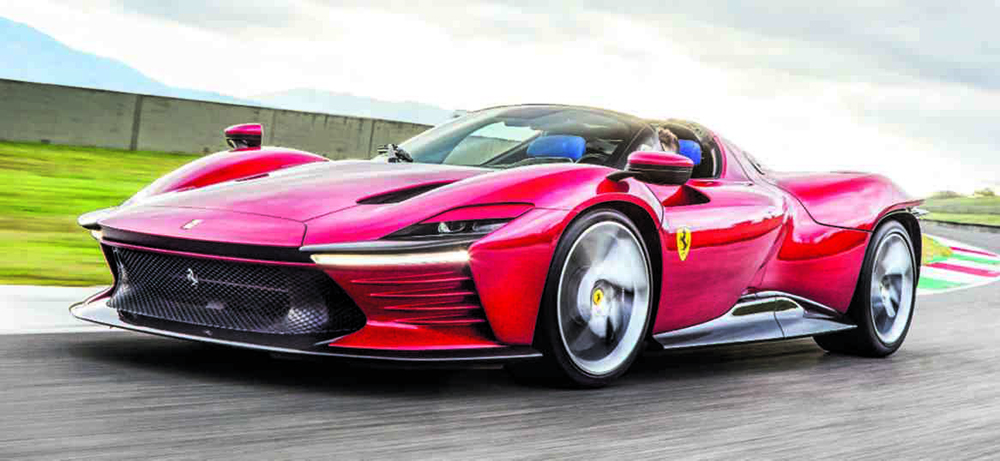Inside the Billion-Dollar Power Move That Keeps Ferrari Untouchable
Ferrari’s Best Customers Are the Ones They Reject.
In a world obsessed with growth, Ferrari moves differently. While most carmakers crank out units for mass markets, Ferrari has mastered the art of saying no. It’s not about volume — it’s about value.
In 2023, Ferrari sold just 11,155 cars globally. That’s less than what Toyota sells before lunch. But here’s the kicker: demand outpaces supply by over 300%. You can’t just buy a Ferrari. You have to be chosen.
This isn’t accidental. It’s strategy — and it’s working.
From Maranello With Intention: The Birth of a Philosophy

The legend begins: Enzo Ferrari’s first car built in Maranello, setting the foundation for an empire built on exclusivity.
Back in 1947, Enzo Ferrari built his first car in Maranello, Italy. From the beginning, he wasn’t chasing sales. He was chasing legacy.
The phrase insiders whisper?
“Ferrari chooses the driver.”
That’s more than branding — it’s policy. Every buyer is vetted. Reputation, behavior, even online image are scrutinized. If you don’t align with Ferrari’s values, it doesn’t matter how deep your pockets are. You’re out.
Ferrari’s Celebrity Blacklist: When Fame Isn’t Enough
Some of the world’s biggest stars are banned from buying new Ferraris. Not for lack of funds — but for lack of fit.
-
Justin Bieber broke every rule in the book. He illegally modified his 458 Italia and tried flipping it at a charity auction. Ferrari blacklisted him — permanently.
-
Kim Kardashian was rejected not for what she drove, but how she promoted it. Her image, curated on social media, didn’t align with Ferrari’s tightly controlled brand aura.
-
50 Cent Banned for posting “inappropriate” content involving his car.
-
Nicholas Cage, once a loyal Ferrari owner, was blacklisted after financial troubles led to vehicle repossession. Ferrari values financial stability more than celebrity status.
-
Floyd Mayweather, despite owning multiple Ferraris, was quietly excluded from future limited editions for his excessive, flashy online posts.
Ferrari’s Luxury Rulebook: Be Discreet, Be Wealthy, Be Worthy

The LaFerrari — a car you don’t buy, you’re invited to own. Only 500 made worldwide.
Ferrari’s selection process is ruthlessly exclusive:
-
Men over 40 are preferred
-
You can’t own a Lamborghini (seriously)
-
Clean financial and public records required
-
No flashy modifications
-
No unauthorized resales
-
No Instagram clout-chasing
For limited editions like the LaFerrari (500 units) and Daytona SP3, you don’t apply. You’re invited. In fact, every Daytona was pre-sold before production began.
Even Steve Wynn, billionaire casino mogul, was penalized after trying to flip his LaFerrari. Ferrari stripped his dealership privileges. No one is above the rules — and that’s the point.
Rejection Creates Desperation: The Psychology Behind Saying No

All pre-sold: Ferrari’s Daytona SP3 showcases the brand’s unmatched demand and scarcity.
Ferrari doesn’t just permit scarcity — it manufactures it. By rejecting certain buyers, it increases desire across the board. Every rejection fuels the perception of rarity.
This is what psychologists call "scarcity bias." When people can’t have something, they want it more. Ferrari has turned this into a billion-dollar moat.
As reported by Robb Report and CarBuzz, Ferrari’s refusal to scale has protected its resale market and boosted collectability. Its cars appreciate — even before they’re driven.
Ferrari isn’t competing on price. It’s competing on identity. It doesn’t sell you a car. It sells you a seat at the table — and even that is invite-only.
The Strategy Works: Scarcity Sells Better Than Scale
Let’s talk numbers:
-
11,155 cars sold annually
-
$3.3 billion net profit in 2023
-
300% more demand than supply
-
Zero discounting
Ferrari makes fewer cars than people want, and it keeps those cars off the wrong roads — and out of the wrong hands. That’s how you maintain mystique. That’s how you build a brand that ages like fine Barolo.
Interested in More Luxury Brand Power Plays?
Finance Monthly has you covered. Dive into more exclusive business stories:
-
How Hermès Turned the Birkin Into a Billion-Dollar Secret Club
-
The LVMH Empire: Why Exclusivity Is More Profitable Than Expansion
-
From Sabotage to Success: Richard Branson’s Virgin Atlantic Power Move
Final Word: Rare Beats Rich Every Time
Ferrari isn’t just a carmaker. It’s a case study in luxury brand control. While others chase scale, Ferrari chases selectivity. It’s not about how many you can sell. It’s about who you sell to — and more importantly, who you don’t.
In a hyper-connected world where everything is for sale, Ferrari’s greatest flex is that you can't buy one — unless they let you.
People Also Ask
Q: Why does Ferrari blacklist certain customers like Justin Bieber and Kim Kardashian?
A: Ferrari maintains a strict customer vetting process to protect its brand image and exclusivity. Celebrities who modify cars illegally, promote the brand in ways that don’t align with Ferrari’s values, or engage in inappropriate behavior may be blacklisted to preserve brand prestige (source).
Q: How many cars does Ferrari produce each year?
A: Ferrari produces roughly 11,000 to 12,000 cars annually, intentionally limiting supply to keep demand high and maintain exclusivity (source).
Q: What is Ferrari’s customer selection process?
A: Buyers undergo a vetting process evaluating financial stability, previous Ferrari ownership, behavior, social image, and even age. Certain rules apply, such as restrictions on owning competitor brands like Lamborghini or flipping cars for profit (source).
Q: Does celebrity status guarantee access to Ferrari limited editions?
A: No. Even celebrities with wealth can be denied access if they don’t meet Ferrari’s strict criteria or brand alignment standards. Limited edition models like LaFerrari and Daytona SP3 require special approval and invitations (source).
Q: How does Ferrari benefit financially from rejecting customers?
A: By maintaining scarcity and exclusivity, Ferrari creates high demand, allowing premium pricing and protecting resale values. The brand’s rejection policy fuels its mystique and long-term profitability (source).













